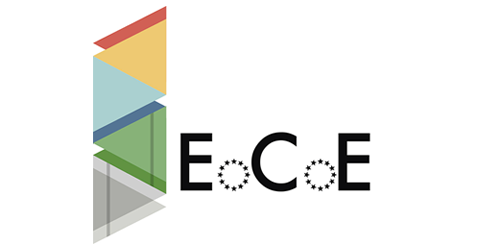The Energy-oriented Centre of Excellence (EoCoE) applies cutting-edge computational methods in its mission to accelerate the transition to the production, storage and management of clean, decarbonized energy. EoCoE is anchored in the High Performance Computing (HPC) community and targets research institutes, key commercial players and SMEs who develop and enable energy-relevant numerical models to be run on exascale supercomputers, demonstrating their benefits for low-carbon energy technology. The present project draws on a successful proof-of-principle phase of EoCoE-I, where a large set of diverse computer applications from four such energy domains achieved significant efficiency gains thanks to its multi-disciplinary expertise in applied mathematics and supercomputing. During this 2nd round, EoCoE-II channels its efforts into 5 scientific Exascale challenges in the low-carbon sectors of Energy Meteorology, Materials, Water, Wind and Fusion. This multidisciplinary effort harnesses innovations in computer science and mathematical algorithms within a tightly integrated co-design approach to overcome performance bottlenecks and to anticipate future HPC hardware developments. A world-class consortium of 18 complementary partners from 7 countries forms a unique network of expertise in energy science, scientific computing and HPC, including 3 leading European supercomputing centres. New modelling capabilities in selected energy sectors will be created at unprecedented scale, demonstrating the potential benefits to the energy indus-try, such as accelerated design of storage devices, high-resolution probabilistic wind and solar forecasting for the power grid and quantitative understanding of plasma core-edge interactions in ITER-scale tokamaks. These flagship applications will provide a high-visibility platform for high-performance computational energy science, cross-fertilized through close working connections to the EERA and EUROfusion consortia.
EoCoE is structured around a central Franco-German hub coordinating a pan-European network, gathering a total of 7 countries and 21 teams. Its partners are strongly engaged in both the HPC and energy fields. The prima-ry goal of EoCoE is to create a new, long lasting and sustainable community around computational energy science. EoCoE re-solves current bottlenecks in application codes; it develops cutting-edge mathematical and numerical methods, and tools to foster
the usage of Exascale computing. Dedicated services for laboratories and industries are established to leverage this expertise and to develop an ecosystem around HPC for energy.
We are interested in collaborations in the area of HPC (e.g., programming models, exascale architectures, linear solvers, I/O) and also with people working in the energy domain and needing expertise for carrying out ambitious simulation.
See our service page for more details: http://www.eocoe.eu/services




